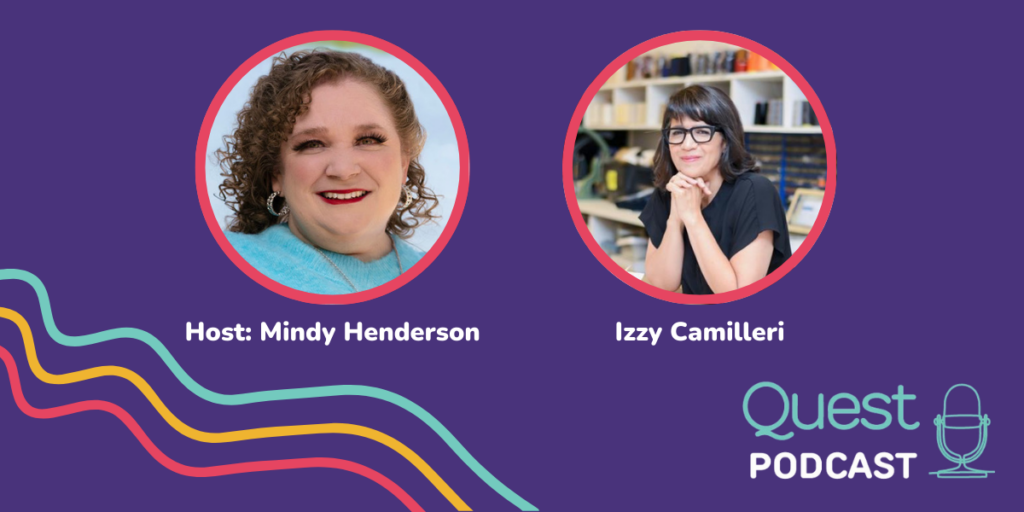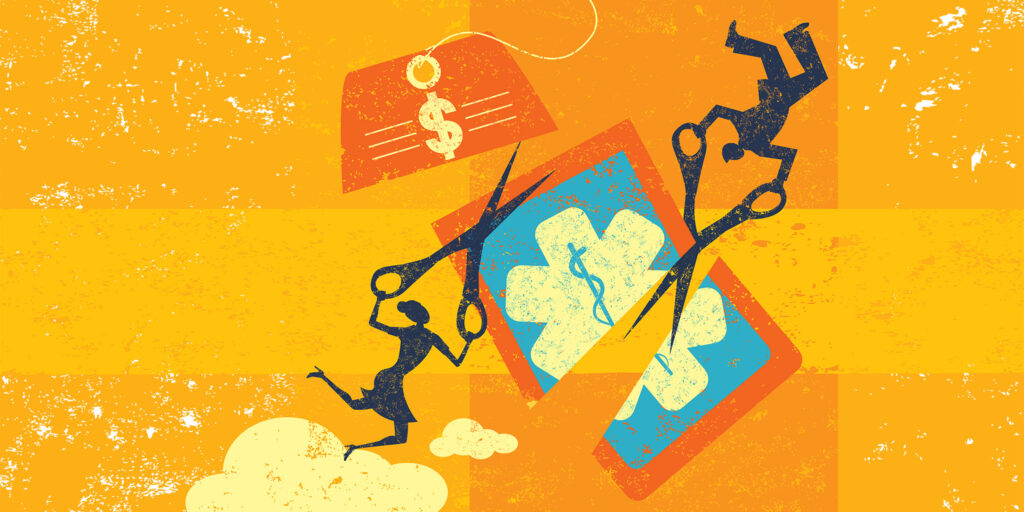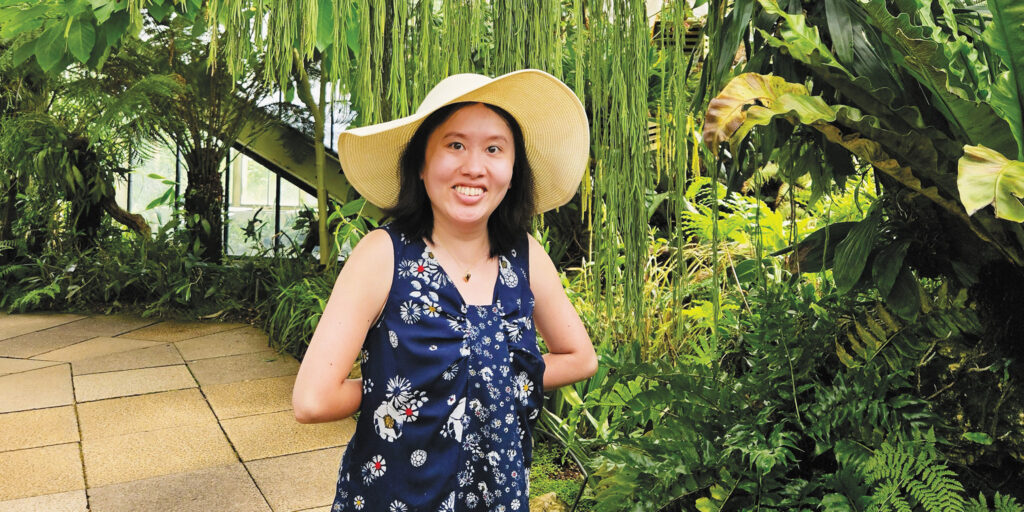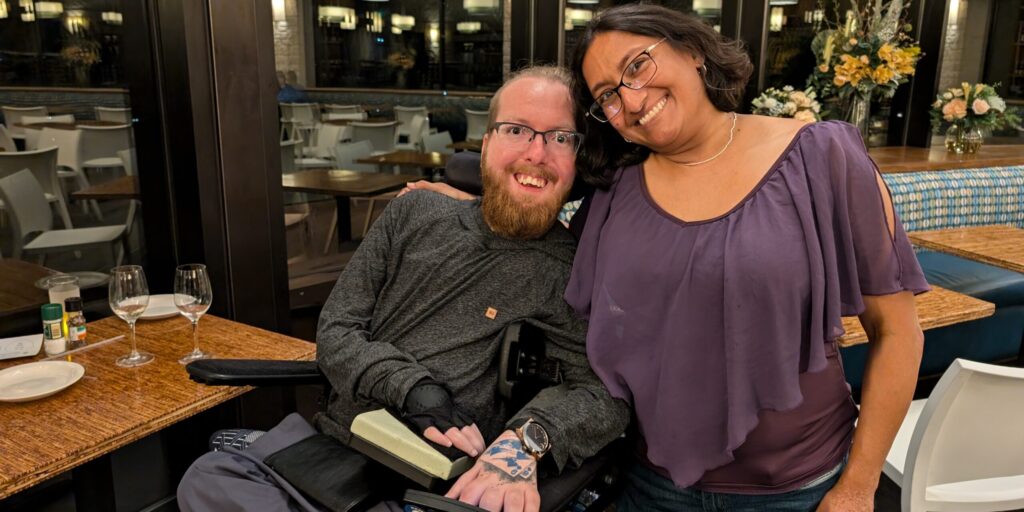
MDA Ambassador Guest Blog: More Than a Mold: Building Authentic Love and Relationships
By K.L. Cleeton | Monday, February 10, 2025
5 Second Summary
MDA Ambassadors play an essential role in furthering MDA’s mission while representing and empowering the neuromuscular disease community. Quest Ambassador Guest Blog series provides a platform to share their personal stories, perspectives, and experience.
K.L. Cleeton is an entrepreneur, poker professional, and social media influencer committed to empowering individuals to realize their potential. He focuses on startup development and motivates others to overcome their limitations, to achieve more than they imagined they could. He is currently an advisor to Vendoor, an app that enhances efficiency and streamlines operations in the construction and retail sectors.
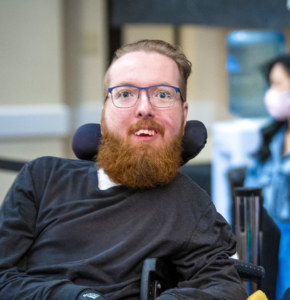
K.L. Cleeton
There’s a moment in everyone’s life when the quiet whisper of self-doubt becomes deafening. For many, it happens in love—when you’re left wondering, “Am I truly worthy of being loved? Am I desirable?” These thoughts creep in slowly, often fueled by past rejections, societal pressures, or the weight of our own insecurities. For those of us who feel different—whether through physical disability, past experiences, or our unique journeys—these questions can feel insurmountable.
But here’s the truth: we are all worthy of love and being desired. The journey to believing that starts within.
The roots of self-doubt
It’s easy to internalize feelings of unworthiness when the world sends us conflicting messages about what makes someone “lovable.” For me, living with spinal muscular atrophy (SMA) meant facing societal assumptions that people with disabilities are somehow “less desirable.” Combine that with the sting of rejection—something everyone faces at some point—and self-doubt can settle in like an unwelcome houseguest.
But self-doubt doesn’t always originate externally. Sometimes, it comes from the stories we tell ourselves: “I’m not good enough,” or “Who could want someone with my challenges?” These narratives often become so loud that we forget to examine what truly makes us valuable.
Redefining love and romance
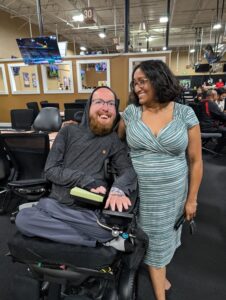
K.L. and Sadia at The Lodge
To overcome these feelings, we must start redefining love and romance. They are not just about fitting into societal molds of beauty or perfection. Love isn’t earned by being flawless; it’s about connection, understanding, and shared growth.
My girlfriend put it perfectly in a text she sent me after I told her about being asked to write this blog. She mused on our relationship by writing: “One of the things I’ve been reflecting on about us is that we have the gift of having no mold to fill. There’s no other couple that works like us, so we’re not trying to fill anyone else’s idea of love. We just carve out the shape that works for us, and somehow, there are more and more dimensions to connect on.”
This quote resonates deeply because it shifts the focus from comparison to creation. Love isn’t about living up to someone else’s expectations—it’s about building something authentic and unique.
The role of vulnerability
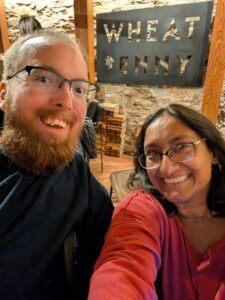
K.L. and Sadia at The Wheat Penny
Believing you are worthy of love requires vulnerability—a willingness to be seen, even when it feels risky. Vulnerability isn’t weakness; it’s the courage to say, “This is who I am; take it or leave it.”
For most of my life, I wore what I call my “positivity mask.” On social media and in public, I presented the relentlessly happy version of myself: the guy in the wheelchair with the big smile who seemed like nothing could ever get him down. And it wasn’t fake—I am a positive person. But it wasn’t the whole truth. Behind the smile, there’s also sadness, fear, and doubt.
The turning point came when I met my girlfriend. For the first time, I felt safe enough to let my mask slip. I shared the parts of myself I usually kept hidden: the frustration of my limitations, the grief over lost opportunities, and the fear that I might never be enough for someone else. Instead of turning away, she leaned in. She saw the whole me—the joy and the pain—and she loved me not despite it but because of it.
In that moment, I realized that being fully authentic wasn’t just the key to building love with another person—it was also the key to loving myself.
Building self-belief
Self-belief doesn’t happen overnight, but it’s a muscle you can strengthen. Here are some steps that have helped me:
- Affirm yourself daily: Replace negative self-talk with affirmations like, “I am deserving of love” or “My differences make me unique and valuable.”
- Celebrate your qualities: Identify the traits that make you who you are—your humor, kindness, resilience—and lean into them.
- Shift perspectives: Instead of seeing challenges as obstacles, view them as part of your unique story that adds depth to your identity.
- Seek support: Therapy, friends, and communities like MDA can be powerful allies in helping you see your worth.
Recognizing your value in relationships
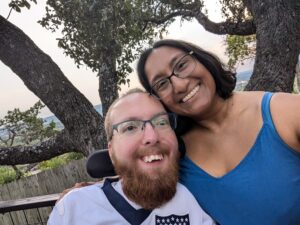
K.L. and Sadia in Austin
A common fear for many is that love comes with pity or obligation. This couldn’t be further from the truth. Love is a choice, not a charity. In a healthy relationship, both partners bring value to the table. You are not “less than” because you have challenges—you are equal because you have qualities that make you a great partner.
It’s important to recognize that love isn’t about what you lack; it’s about what you bring. Whether it’s your humor, intellect, or compassion, these are the things that make you magnetic.
Overcoming the fear of rejection
Rejection is painful, but it’s not the enemy. The real enemy is letting rejection keep you from trying again. I’ve learned that rejection isn’t about worth. It’s about compatibility. Not every person is the right match, and that’s okay.
Every “no” is one step closer to finding someone who sees and values you for who you are. It’s a lesson in resilience, and each attempt builds confidence in your ability to love and be loved.
Finding confidence in authenticity
One of the greatest gifts you can give yourself is permission to be authentic. Hiding parts of yourself, whether out of fear or shame, only diminishes your light. By embracing who you are, you’ll attract people who are drawn to your authenticity.
When I stopped worrying about how others perceived my disability and instead focused on being the best version of myself, I noticed a shift. The people who mattered saw me for me, not for my chair or my condition.
Celebrating love in all forms
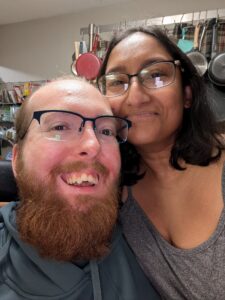
K.L. and Sadia
Romantic love is beautiful, but it’s just one form of connection. Self-love, friendships, and community ties are equally important. Each of these relationships reinforces your worth and reminds you that love isn’t conditional—it’s abundant.
Nurturing love in all areas of life will create a foundation of confidence that will radiate into your romantic pursuits.
Believing you are worthy of love and desire is a journey, not a destination. It’s about rejecting societal molds, embracing your authentic self, and creating a love story that is uniquely yours. As my girlfriend said, love doesn’t have to fit into pre-made shapes. It’s something we carve out for ourselves, layer by layer, connection by connection.
To anyone doubting their worth, know this: You are not just worthy of love; you deserve a love that celebrates you in all your dimensions. The journey begins with believing this.
Next Steps and Useful Resources
- Listen to conversations with inter-abled couples in the Quest Podcast episode Love & Marriage.
- Learn more about forming healthy romantic relationships when one or both partners have a disability.
- Browse MDA’s Mental Health Hub.
- MDA’s Resource Center provides support, guidance, and resources for patients and families. Contact the MDA Resource Center at 1-833-ASK-MDA1 or ResourceCenter@mdausa.org
- Stay up-to-date on Quest content! Subscribe to Quest Magazine and Newsletter.
Disclaimer: No content on this site should ever be used as a substitute for direct medical advice from your doctor or other qualified clinician.


